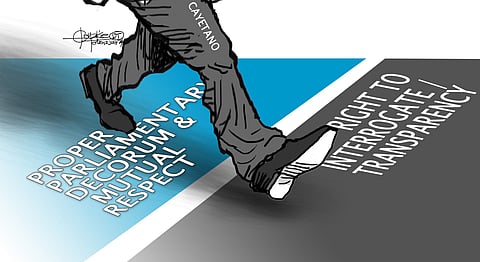
- NEWS
- the EDIT
- COMMENTARY
- BUSINESS
- LIFE
- SHOW
- ACTION
- GLOBAL GOALS
- SNAPS
- DYARYO TIRADA
- MORE

Recent events have brought significant attention to a contentious exchange between two prominent senators, Alan Peter Cayetano and Nancy Binay, during a Senate hearing.
The heated confrontation has not only sparked public interest but has escalated to a formal complaint filed by Binay against Cayetano before the Senate Ethics Committee. This development underscores broader implications for parliamentary decorum and the conduct of elected officials in the Philippines.
The incident unfolded during a high-profile Senate hearing on the burgeoning cost of the new Senate building, where tensions between Senators Cayetano and Binay came to a head. Witnesses reported a heated exchange characterized by raised voices and pointed accusations, capturing the attention of media outlets and the public alike.
Binay accused Senator Cayetano of obstructing the proceedings and displaying disrespectful behavior towards fellow senators and witnesses. Her decision to file a formal complaint with the Senate Ethics Committee signals her stance on the severity of the incident and its potential ramifications for legislative conduct.
In a statement to the press after she filed her complaint, Binay emphasized the importance of upholding parliamentary decorum and mutual respect among colleagues in the Senate. She cited specific instances during the hearing when Senator Cayetano’s conduct, in her view, crossed established norms of civility and cooperation.
The filing of the complaint has ignited a broader conversation within political circles and among the Filipino public regarding the standards of behavior expected of elected officials.
Many citizens expressed concern over the implications of such confrontations on the effectiveness of legislative proceedings and the overall public perception of the Senate as an institution tasked with representing the interests of the Filipino people.
Cayetano, in response to the complaint, defended his actions during the hearing, arguing that he was merely asserting his right to interrogate witnesses thoroughly and ensuring transparency in the discussion on the budget for the new Senate building. His supporters within the Senate and among the electorate contend that robust debate and passionate advocacy are integral to the democratic process, even if they occasionally lead to spirited exchanges among lawmakers.
However, critics of Senator Cayetano argue that his behavior crossed the line of professionalism and respect expected within the Senate chamber. They assert that while vigorous debate is encouraged, personal attacks and disruptive behavior undermine the integrity of legislative proceedings and detract from substantive policy discussions.
The Senate Ethics Committee now faces the weighty task of adjudicating this complaint impartially and in accordance with established procedural guidelines. The committee’s decision will likely set a precedent for how similar disputes are handled in the future and may influence the conduct of senators during debates and hearings.
Beyond the immediate implications for Senators Cayetano and Binay, this incident has broader implications for the public’s perception of political leadership and accountability in the Philippines.
Many Filipinos view the Senate as a crucial institution responsible for enacting laws and policies that impact their daily lives. As such, the behavior of senators both within and outside the legislative chamber holds significant symbolic and practical importance.
Moreover, the timing of this controversy coincides with ongoing public scrutiny of government officials’ conduct amid calls for greater transparency and accountability in public service.
The outcome of the Ethics Committee’s deliberations will be closely monitored by citizens, civil society organizations, and the media as a litmus test of the Senate’s commitment to upholding ethical standards and promoting constructive dialogue among lawmakers.
As a whole, Binay’s filing of a complaint against Cayetano following their heated exchange in a Senate hearing underscores the complexities of political discourse and parliamentary conduct in the Philippines.
This incident highlights the delicate balance between robust debate and respectful interaction among elected officials and raises important questions about accountability and professionalism within the legislative branch.
As the Senate Ethics Committee prepares to investigate this matter, its decision will undoubtedly shape perceptions of governance and legislative integrity in the eyes of the Filipino public.
